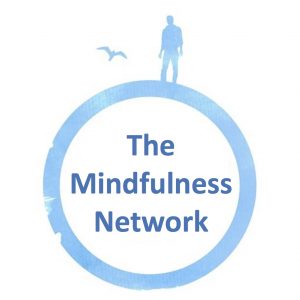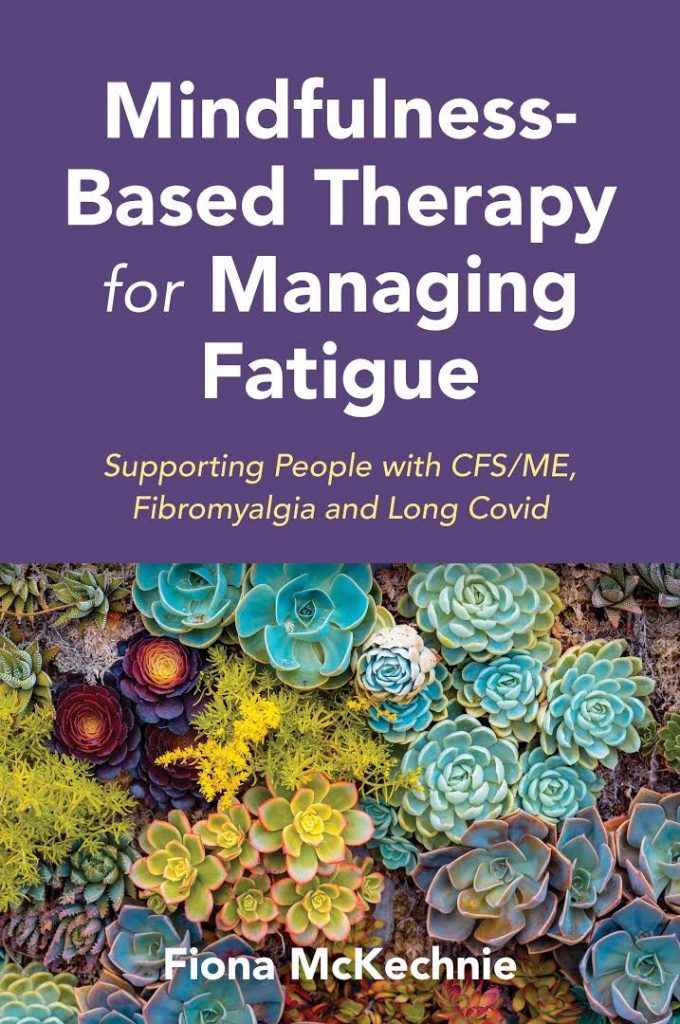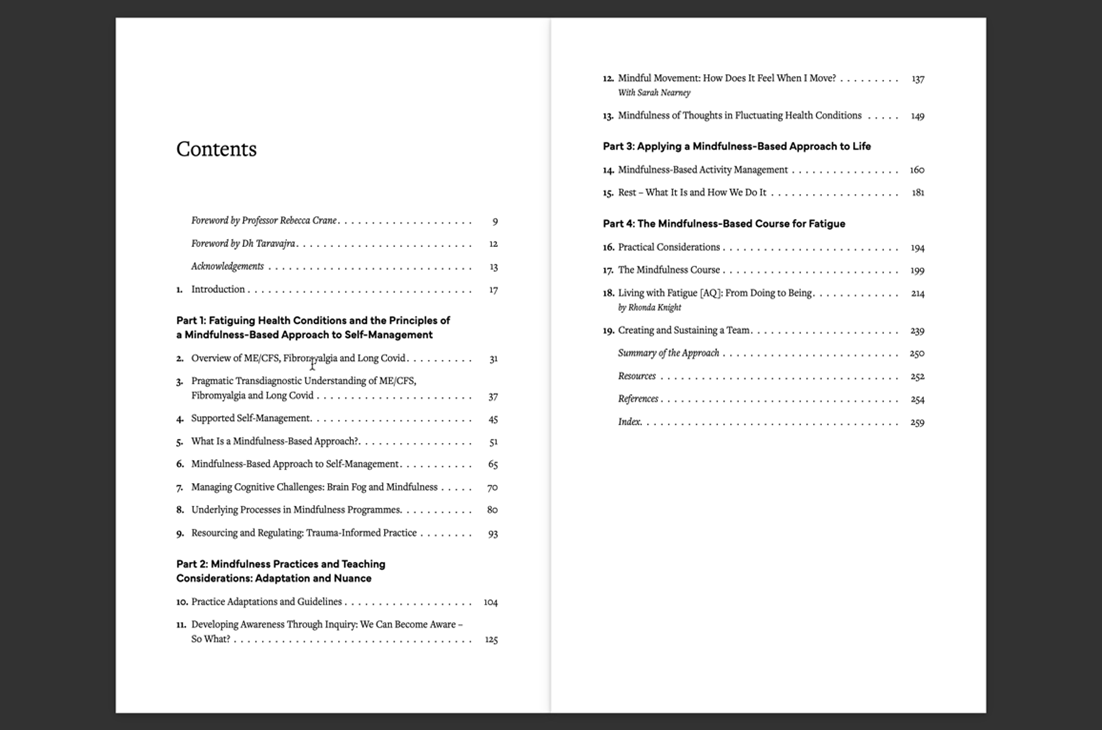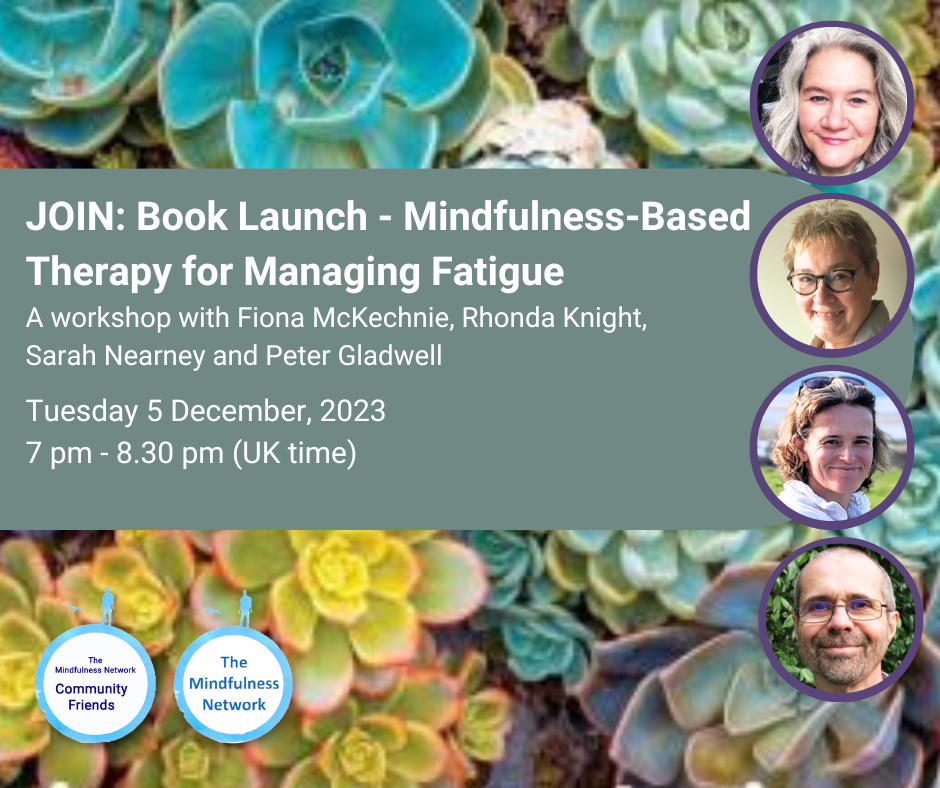
~ written by Fiona McKechnie who completed mindfulness training with Bangor University in 2016 and has recently published a new book Mindfulness-Based Therapy for Managing Fatigue ~
Mindfulness for fatigue – an adapted MBCT programme for people with ME/CFS, fibromyalgia and Long COVID
The mindfulness for fatigue programme came about from conversations with people who had completed self-management programmes within our service (Bristol M.E. Service, NHS) who had found mediation useful as part of their experience at living with persistent fatigue. I have a long-standing meditation and yoga practice and had been doing an 8-week mindfulness course for myself so we worked together to develop the mindfulness programme bespoke to the needs of people living with debilitating fatigue syndromes who came to an NHS clinic.
The programme now comes with the experience of 12 years clinical application and has been developed with hundreds of participants feedback, experience, and reflections. While the approach has not yet been formally measured in a controlled trial, clinical outcomes are positive that there are improvements in the ability to manage the condition.
Mindfulness is primarily a process of cultivating awareness, a term I find more helpful than “mindfulness”. Learning to acknowledge and tend to what has happened and is happening when living with a multi-system complex condition such as ME/ Chronic Fatigue Syndrome, fibromyalgia and Long Covid is challenging. For instance, the initial illness may well have been extremely difficult. COVID; glandular fever or other viral infection can be very serious and involve hospitalisation and emergency treatment. However, the severity of the initial infection is not necessarily related to severity of ongoing fatigue symptoms. A less serious initial infection but with longer term consequences has its own strains and suffering. Medical tests to investigate the fatigue, pain, cognitive problems, digestion problems, dizziness and so on, come back clear which can be a relief but can lead to further distress and misunderstandings. Doubt and disbelief from self, family, friends, employers and in some cases, health professionals can compound the struggle.
The fluctuations in symptoms and variability in activity levels make it complicated for the individual to understand as well as those around them. Each person’s experience is unique which also adds to confusion – some might wonder: if others have recovered after 6 months of long COVID, why am I still ill 3 years on? The array of information and reports of things that “cure”, including diet, breathing techniques, positive thinking, meditation, exercises are confusing, contradictory and can add to feelings of isolation when yet another thing doesn’t “work”.
For everyone we see, the consequences of the longer term symptoms impact on all areas of life: employment and education, social life; family and relationships can all be affected. The emotional impact can be overwhelming as people live with grief, anxiety, and frustrations. There is a need to reappraise many aspects of life to manage day to day, never mind longer term changes which are an even more complex endeavour.
Gently acknowledging this complex array of symptoms and consequences of long term fatigue is an ongoing process of exploration of a very much unwanted and challenging situation and experience.Mindful awareness can provide useful support when it is used with an intention to explore what is going on, unpack what can be looked at and what needs to be let go for the moment. Mindfulness can support and develop self-management strategies such as enabling rest by unwinding through movement and the reappraisal of how we carry out activity so it can be managed sustainably.
Compassionate awareness enables us to realise when all the “strategies” have not “worked” and we are in a flareup. As well as manging setbacks when they arise, it can be possible to notice when we are going to do something that is likely to exacerbate symptoms, but choosing to do this and scheduling time out to prepare and recover and communicate with others can mean less pain and anguish during a more difficult time. Stressful situations are very likely to increase symptoms and impact on how we feel; mindfulness-based approaches offer ways to care for oneself during tough times. This is not an easy or comfortable process and for some it is important to stop the course or be seen individually to bespoke the approach further, and for some to repeat the course later on.
The Mindfulness for fatigue course is supported by patient volunteers and co-teachers, two of whom have been closely involved in the book. Rhonda Knight has written a chapter on her experience of the course from her journals and insights in supporting people on their progress through the course. Physiotherapist Sarah Nearney did the course for herself in her recovery from the prolonged effects of glandular fever and found the movement component highly significant. She has now trained as a mindfulness teacher and uses this approach in her clinical practice in palliative care. She shares both her personal experience and her clinical application within the movement section of the book.
I have looked in detail at the programme within my personal supervision and meditation practice and have shared the programme with other clinicians in workshops and conversations. Putting my thoughts and learning together as a book (rather than as a thesis) meant I was able to go into more subjective depth and reflection. Publication means it can be disseminated widely for use by clinicians in the field and be part of a wider conversation, including potential formal evaluation. Publishing in this format with an associated website may be useful for those living with fatigue who are not able to access a specialised programme.
The book is inspired by and filled with stories from clinical practice of people who have used mindfulness to support their management of complex health conditions. Most of the stories are amalgamations to represent themes I see in my work rather than direct stories. The patterns of experience are very familiar and while there is a uniqueness to each person’s situation, there is a commonality that I hope to share so others know they are not alone.
Perhaps the best words on how mindfulness can support fatigue management come from our participants:
‘It’s hugely increased my self-awareness so I’m better placed to understand my habits and patterns, and why/when they’re getting me into trouble; and allowing me to focus my practice on those areas likely to be of most benefit. It’s helpful for pacing and taking more appropriate and timely action. The most significant benefit has been in increasing my self-compassion, and the many knockon benefits that has.’
‘To breathe with mindfulness enables me to put things into perspective, which in turn enables me to approach the challenging dilemmas of the everyday in a calm and collected way, to respond with a calm reason and authoritative self-assurance.’
‘I am less angry and impatient, so able to enjoy those simple little things in my daily life. Sometimes I am overwhelmed at how many good things happen in a day, when in the past, I wouldn’t have recognized good events, even when they were really obvious.’
‘I am so much kinder towards myself. More compassionate towards others and less judgemental on myself and others. Maybe I am not such a perfectionist, and that is a relief, as it took a lot of energy to maintain such high standards.’
Please see the mindfulness for fatigue website for more information about the book, audio recordings and other resources including training in the approach hosted at fionamckechnie.co.uk.
Join Fiona and colleagues for the Book Launch and evening workshop on the 5th December 2023 at 7pm (UK Time)! The event is free to attend in collaboration with the Mindfulness Network Community Friends (MNCF) offer a programme of donation-based events and inspiring content.
Donation Event: ‘Mindfulness-Based Therapy for Managing Fatigue’ Book Launch and Workshop
When: 5 Dec 2023, 7pm
Where: Online Event
Tutors: Fiona McKechnie, Peter Gladwell, Rhonda Knight, Sarah Nearney
After the event, a recording will be made available on our Community site: https://community.mindfulness-network.org/course/view.php?id=272
Please consider making a donation which will help to fund our bursaries and make a big difference in helping us widen access to mindfulness-based approaches.
 Fiona Mckechnie is the author of the book Mindfulness-Based Therapy for Managing Fatigue. She is an Occupational Therapist and one of the senior clinicians in the Bristol ME service, with over 25 years of working within fatigue services.
Fiona Mckechnie is the author of the book Mindfulness-Based Therapy for Managing Fatigue. She is an Occupational Therapist and one of the senior clinicians in the Bristol ME service, with over 25 years of working within fatigue services.
She has a long-standing personal meditation practice, training at Bangor University with a certificate in Mindfulness teaching and an MSc in Mindfulness-based approaches, she also has an interest in employment and fatigue syndromes. She is a trustee of BACME (British Association of Clinicians in ME/CFS) and has been involved in therapist training for many years.







